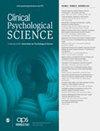通过简短的小组社交归属干预,改善黑人、印地安人和第一代大学生的心理健康和学业成绩
IF 4.1
2区 医学
Q1 PSYCHIATRY
引用次数: 0
摘要
尽管学院和大学校园更加强调多样性和包容性,但不平等现象依然存在。意识到对成功的结构性和社会性威胁,可能会导致来自代表性不足身份的学生质疑他们是否完全属于某所学校,从而危及他们的心理健康和学业成绩。本研究测试了一种简短的社会归属感干预,该干预以小组形式进行,强调第一年的挑战是正常的,随着时间的推移,学生们会建立起加深归属感的关系。基线归属感较差的参与者(122 人)在 14 个月的随访期间出现了更严重的抑郁症状、更多的担忧和更差的心理健康。干预措施大大降低了大学头两年患重度抑郁症的风险,特别是降低了参与者遭受更多歧视的风险。关于干预措施将改善黑人、土著人、有色人种和第一代大学生的心理社会或学业成绩的假设没有得到支持。本文章由计算机程序翻译,如有差异,请以英文原文为准。
A Brief Group Social-Belonging Intervention to Improve Mental-Health and Academic Outcomes in BIPOC and First-Generation-to-College Students
Despite greater emphasis on diversity and inclusion on college and university campuses, inequities persist. Awareness of structural and social threats to success can lead students from underrepresented identities to question whether they will fully belong at a given institution, which jeopardizes their psychological well-being and academic performance. This study tested a brief social-belonging intervention, delivered in a group format, that emphasized that first-year challenges are normative and that, over time, students develop relationships that deepen their sense of belonging. Participants ( N = 122) who reported poorer belonging at baseline experienced greater depressive symptoms, greater worry, and worse psychological well-being over the 14-month follow-up period. The intervention significantly reduced risk for major depression during the first 2 years of college and specifically reduced risk for participants experiencing more discrimination. Hypotheses that the intervention would improve psychosocial or academic outcomes specifically for Black, Indigenous, and people of color and first-generation-to-college students were not supported.
求助全文
通过发布文献求助,成功后即可免费获取论文全文。
去求助
来源期刊

Clinical Psychological Science
Psychology-Clinical Psychology
CiteScore
9.70
自引率
2.10%
发文量
35
期刊介绍:
The Association for Psychological Science’s journal, Clinical Psychological Science, emerges from this confluence to provide readers with the best, most innovative research in clinical psychological science, giving researchers of all stripes a home for their work and a place in which to communicate with a broad audience of both clinical and other scientists.
 求助内容:
求助内容: 应助结果提醒方式:
应助结果提醒方式:


